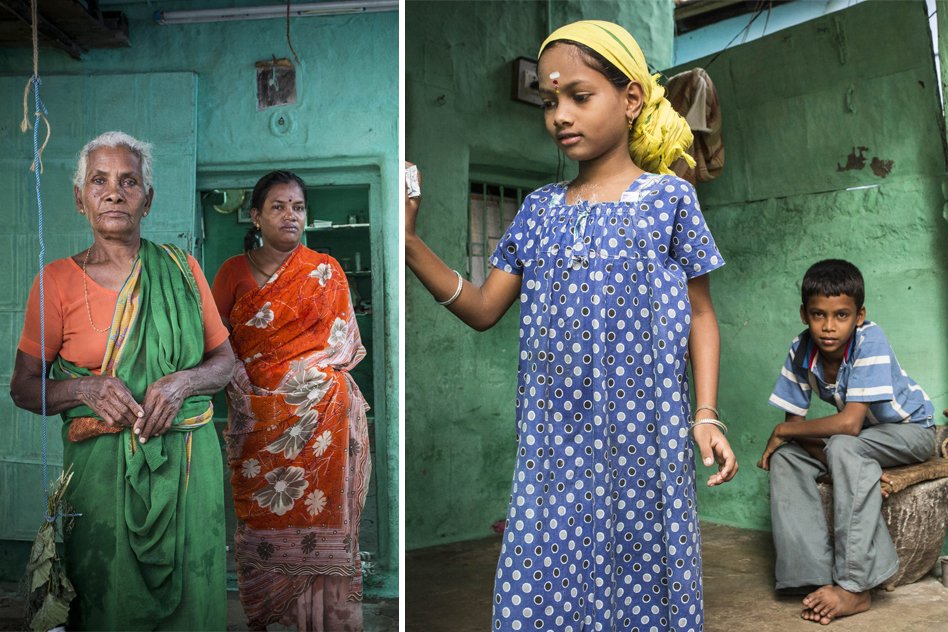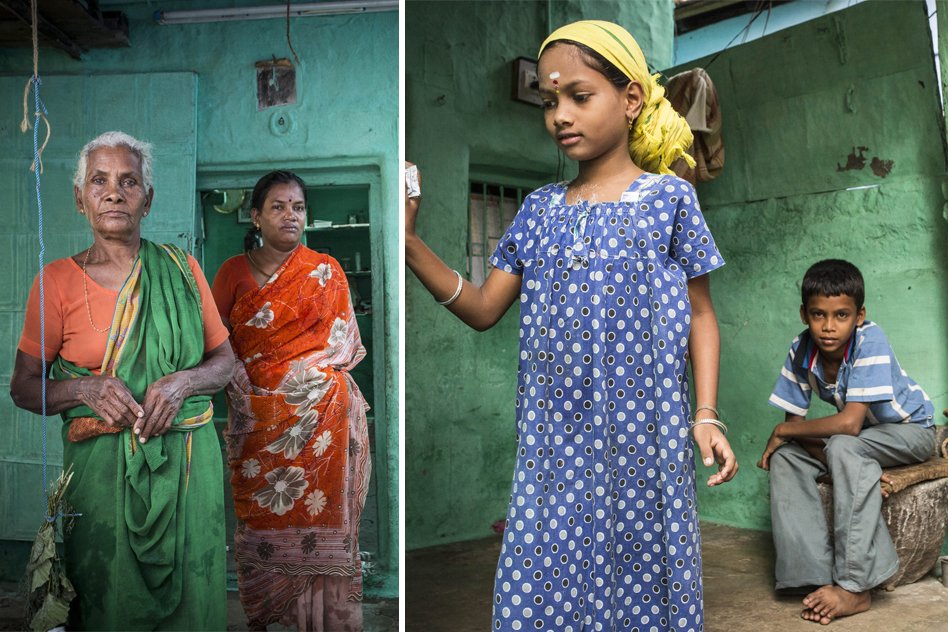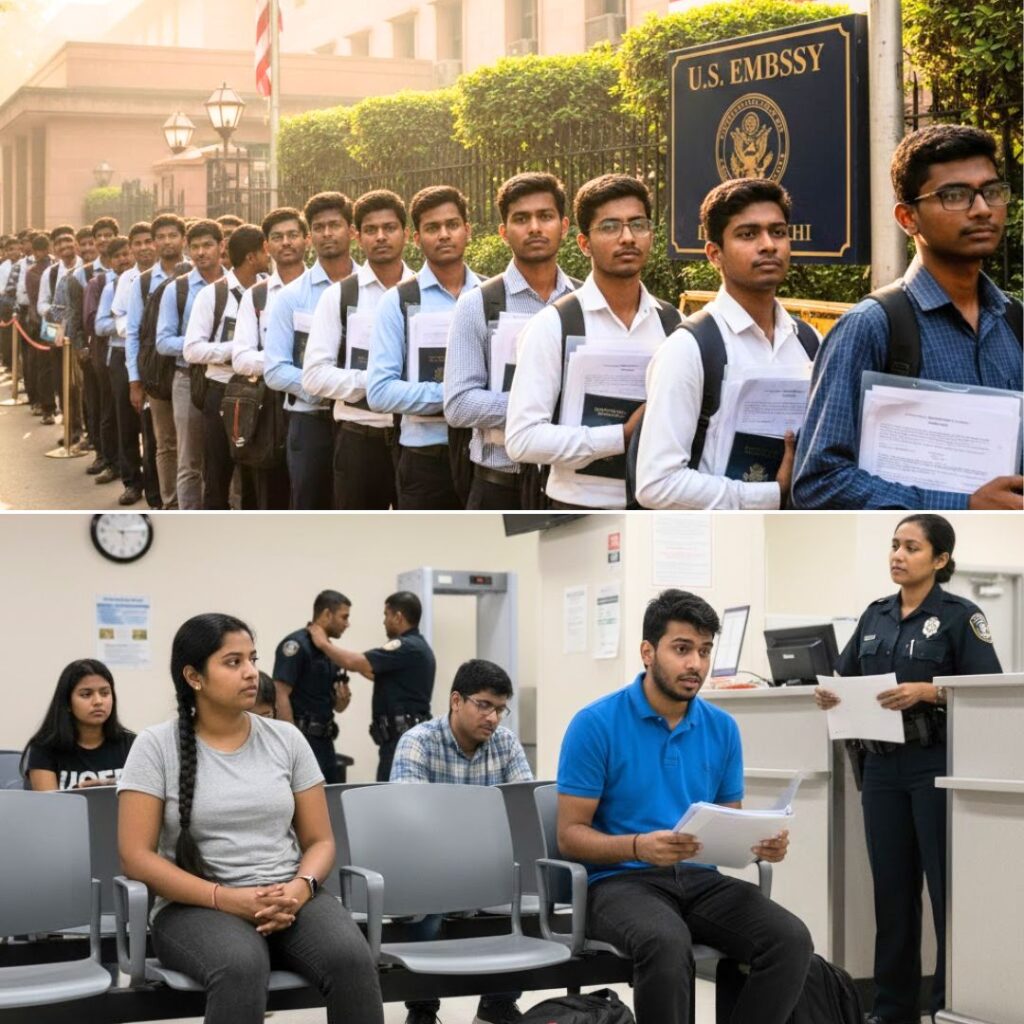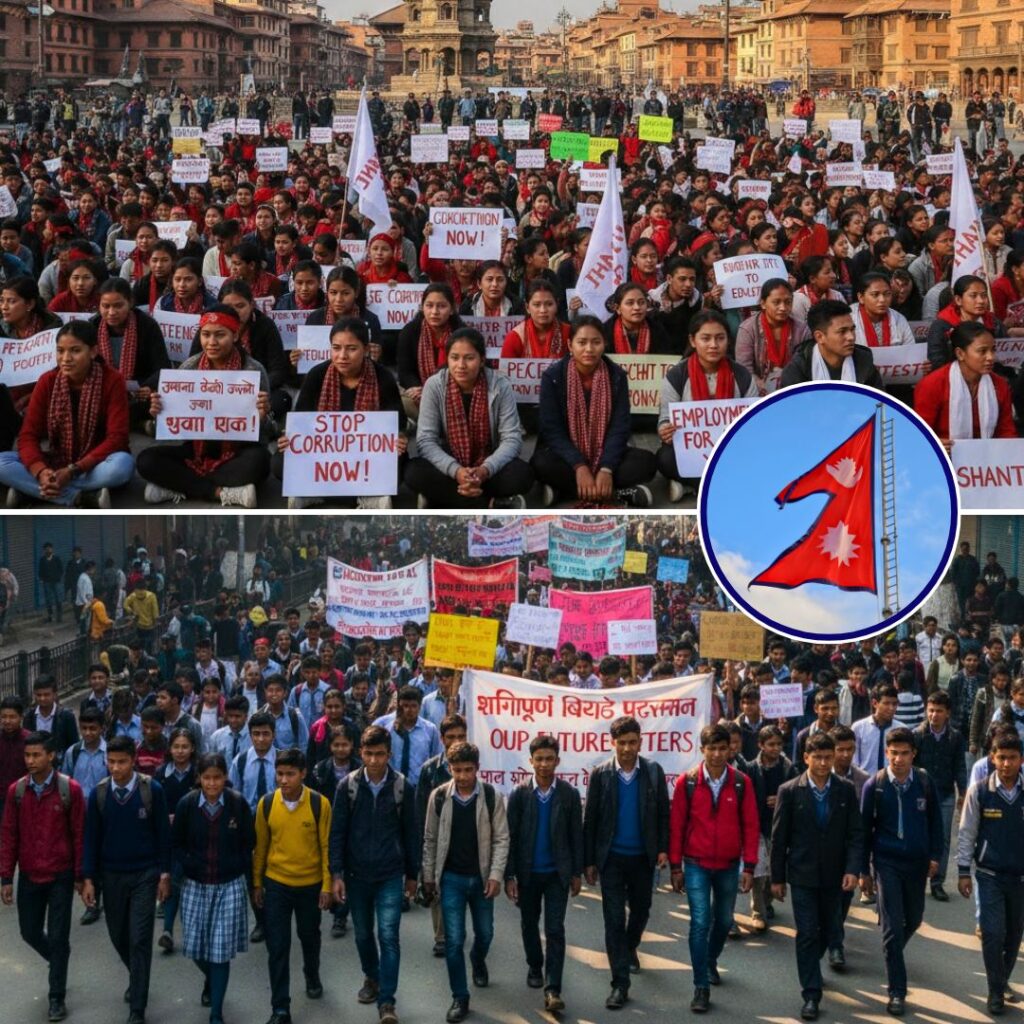This is second part of the story, for the first part kindly visit the link: The Vicious Cycle Of Minimum Wage And Child Labour
The day we met Mari’s family
A few days later, we went to meet Mari’s family before they left to work. Their bright green house stood apart from all the other structures around. When we reached the door, we saw a young boy sleeping outside the house on a plastic sheet. We wondered aloud if it was Mari. He looked different and we were quite convinced that it wasn’t him. There wasn’t a soul in sight and the frenzied gust of wind howled all around the town. A woman clad in a scarlet red saree walk towards us. Her hands were soiled with soap and water. With a polite smile, she explained, “I was doing the dishes. I didn’t hear you guys come at all.”
We pointed at the young boy who was sound asleep on the makeshift porch outside and asked her if he was Mari. She giggled and confirmed that it was indeed her son. We had gotten quite used to seeing Mari in clothes soaked in grease that we couldn’t recognise him in normal attire.
His mother tried to wake him up. But he was in deep slumber, perhaps dreaming of a life where he had a normal carefree childhood, where he had friends to play with; perhaps wishing that his mother didn’t have to work so hard. He refused to budge. His mother kept poking and prodding at him till he snapped angrily at her. In a half-asleep state, he woke up only to find us staring at him. He greeted us with a smile. We were used to seeing Mari as a mature and sincere human being who was taking care of the household like any other adult. Yet again, it slipped our minds that he was just a 14-year-old boy whose life and dreams revolved around his family.
Mari was wide awake now and he looked into the sun. Staring intently at the skies, he was jolted back to his senses. Reality had kicked in as the morning sun peeped through the clouds. And, as customary, he had to leave in an hour to spend endless hours toiling away in the garage.
There was barely any place inside the house for all of us to sit down and talk. So, we decided to make ourselves comfortable outside. There was a hint of smile on Mari’s face as he walked towards a baby goat and brought him to us. In about ten minutes or so, his grandmother walked to the porch and welcomed us with a big smile. We asked her to join us to which she gladly obliged. She spoke very fondly of Mari and hoped that he makes them proud one day.
When Mari’s father left them, they were forced to move into his maternal grandparents’ house. His grandmother also told us that she had a son who worked in Hyderabad. “He would visit us once a year and give us money sometimes. However, for the last six years, I have neither seen him nor heard from him,” she said in an aggrieved tone. We asked her if he had gone missing. To that she replied, “His phone still rings but he never responds. It’s the same pattern for the past six years. My heart races every time I think he might answer my call. But all I’m met with is silence. And, sometimes, that’s the loudest sound in my head. The sound of silence…”
And, soon the realisation had dawned upon us that this was a family that was abandoned by their men time and again; a family that relied on the women to grow stronger every day. For these women, every moment was a victory for they hadn’t succumbed to hopelessness, just yet… Her eyes reflected her angst. Her lips twitched with sorrow as she grasped the edge of her saree. She gazed longingly at the deserted alleyway. Her heart told her that her son would return someday. But, her spirit was already broken. She could no longer bear the agony of waiting for those who had deserted them a long time ago.
Hope was her only defense against misery. She looked at the skies for a sign from her creator wondering how long her faith would be tested. Her thoughts were soon broken with the loud chatter coming from inside the house. She looked at the young boy sitting across her and gave him a reassuring smile. Mari’s grandmother’s face softened as she explained, “The little girl’s name is Gayatri. She is my elder daughter’s child. Her mother is quite adamant to send her to school everyday till she can afford to pay the fees. I am not sure what the future has in store for her. I wish she has a shot at a better life; at least better than the one she is living right now.”
Gayatri’s father abandoned their family when she was quite young. Her mother too decided to move into her parents’ house for they were left with nothing but themselves. The men walked away without a shred of remorse, never to return. Words unspoken and tears un-shed, their mother lamented for their children who bore the brunt of their selfish deeds. Mari’s mother, Kanmani, joined us and shared with us her dreams and aspirations. She pointed at Mari and said, “His official name is Mahendran but we affectionately call him Mari. I think he likes that name.” This made Mari chuckle out aloud. She also told us that as a young boy, Mari was always quite bright and shared a keen interest to pursue whatever intrigued him. He was always driven by curiosity.
“I only want my children to grow and prosper. I don’t want them to suffer anymore. Mari dropped out of school when he was in eighth grade and decided to look for a job. I pleaded with him to continue for two more years. He gave up his only chance at a better life for me. I wish he hadn’t. From what I hear, he is very good at his work. I don’t want any money and neither does Mari. But, if you can do something to support and nurture his skill, I’d be grateful,” she said as tears welled up in her eyes.
Kanmani repeatedly told us that monetary gains have no value in her life and that she hoped her children became successful through their craft. Her younger son Shaktivale stayed with her older sister in Cuddalore near Kumily. One day, the ten-year-old came to her and begged her to send him to his aunt. The schools were relatively better there. He is studying in grade 6 and she is quite content with his progress so far.
We asked her if she was interested in pursuing something else instead of working as a labourer. Most of the plantation workers are paid a meager sum as daily wage which neither lasts them an entire day nor enables them to support their families. “I have been working in the cardamom fields since I was very young. This is all I know. What skills can I pick up at this age? Besides, there’s nothing else to do in this town. And, I refuse to leave my children and migrate to another city for money,” said Kanmani. Her eyes bore into our soul demanding for answers we never had. And, yet again we found ourselves staring into the face of despair.
(to be continued)…
This story is an effort by The Logical Indian in collaboration with Rest Of My Family towards bringing stories which need much attention.
Submitted By – Akshatha Shetty | Photo Credit – Piyush Goswami















